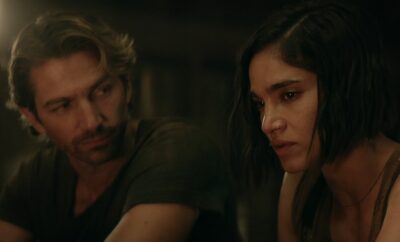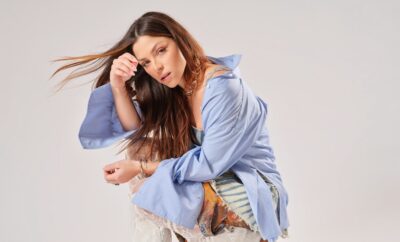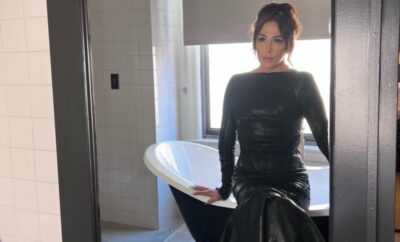 Camilla Cordelia Rubis, Eva Longoria and Molly Haldeman
Camilla Cordelia Rubis, Eva Longoria and Molly Haldeman
Interviews
Camilla Cordelia Rubis – The Expanding Universe of Ashley Garcia
By: Lisa Steinberg
Q) When you first entered the writer’s room for “The Expanding Universe of Ashley Garcia,” what were some of the biggest boundary pushing challenges and what were some of the biggest embraces that you were expecting or not expecting?
A) I think one of the biggest challenges, and something I personally find really intimidating, is the live audience shows. You need to be able to pitch on set and being in front of like a one hundred and fifty person audience and the show going and everyone is on a clock, you have to have everyone out at a certain time and they are like, “We need a joke for this area.” You can be pretty secure in your joke, but when you start to hear the hilarious things the other writers are pitching, you start to clam up. It’s easy to get timid or insecure. And it is such a crappy feeling when you can’t figure out that joke. So, it’s just more motivation. Just pushing through, trying to be funny and pitch jokes confidently, not getting in your head about things and bouncing back.
In terms of things that I would embrace, my partner Molly Haldeman and I, we stepped into a larger role on this show and even got to work on an episode with the creator and an Executive Producer. We learned so much.
Another big embrace was working with Eva Longoria who directed one of our (Molly and I’s) episodes. She directed two episodes in the whole season. She was so on top of things, a really a balanced person. Her family came to tapings. She’s a mom and a director; she’s a whole empire. She’s so warm and relatable and so encouraging to women. When you see someone who is doing the things you want to do, it’s a wild experience. You get older. Maybe we get a little hardened. Maybe we get a little cynical and you lose a little bit of that super drive to dream sometimes. She just brought it back to me. She was in the cutest sweats just killing it. She was just an unbelievable director. Other than that, embracing what a wonderful crew we had and all of the department heads, the writers, every single person involved with this expanding universe. I really say this so sincerely. It was the kindest most talented group of people that I have ever had the opportunity to work with. Everyone really, really brought it every day. It made me want to step it up every time I came to work. We worked with wonderful people who really put the work first who just wanted to come out with the best show. It was a really special experience.
Q) The series is spearheaded by several men including Mario Lopez who serve as EPs. How has working with this talented trio helped shape the series into what we end up seeing on screen?
A) The most important thing to get across is there absolutely just wouldn’t be an “Ashley Garcia” without Mario, the creator Seth Kurland and a gentleman named Mark Roberts who helped pass along this story. Also, Robert Prince at Netflix. We had another gentleman/ EP named David Kendall helping to run the writers’ room. All of these people that I am mentioning are just pros. They have worked really hard for a while and know what they are doing. Seth the creator of this universe was a writer on “Friends.” They know how to build a really well-run machine. We all benefited from their level of experience, their level of commitment. They knew how to make sure that we didn’t have hiccups come up as we are shooting.
All that being said, I do think that truly intelligent men know how to put women in power. We had a lot of female directors and diverse directors. We had Kelly Park, Jody Hahn and Eva. Melissa Joan Hart was a director. They definitely wanted that female voice to be in there and they empowered all of the women on set. They just wanted it to be the best show. Everyone wanted it to be the best show, so they leaned on women to get their female voice across, leaned on Paulina [Chavez], Bella [Podaras], female writers, directors and executives. We had female camera operators and our script supervisor, acting coach etc. Lots of females on set. Lots of female energy.
Q) This isn’t your average teen or preteen type of series. We have an immensely smart Latinx female character at the forefront who is accepted for her brilliance rather than bullied or mocked. We have TV shows like “Young Sheldon,” which is the direct opposite. What does this signify on several levels that Netflix as a streaming service over a network series recognizes the need for these type of standout series that set a very different and high bar/standard and tone?
A) That’s what I love about Netflix the most. They recognize this need to show all sorts of people achieving at a high level and celebrate them. Every race. Every class. Every level of ability. They are really giving voice to a lot of different people who we don’t see represented enough. And Netflix is creating for international audiences. They are helping to show aspirational characters for everyone. Hopefully as people continue to watch this show, Netflix creates more content like that. I am very, very proud to have worked with a place that’s so inclusive, where the brand is everyone. I think it’s really important.
Q) We see a strong female lead at the forefront of the series; she’s resilient and resourceful, but she’s also surrounded by so many supportive people who ground her. How do the people who surround Ashley also help to shape and form who she is as a young adult?
A) What is really cool about people around Ashley is that they not only support her, but they give her balance. Bella’s character Brooke shows her the social world and helps her navigate the complexity of high school and I think she learns a lot from Tad (Conor Husting) and Stick (Reed Horstmann). They are a big influence on how she is going to grow. Her uncle (Jencarlos Canela) is always this stable rock for her, but he will allow her to make mistakes too. He’s not trying to keep her sheltered like her mom.
Q) What does “strong female character” mean to you?
A) It’s a lot about balance. I think we have to wear a lot of hats and play a lot of roles as women. Finding that balance, being strong at home, being strong professionally, being strong spiritually, and personally. Being strong in your community. There are just so many layers to strong women. No matter what, I think the broad definition is just women who go for their goals whatever challenge comes up. I just love how Netflix is casting a really wide net and showing many of the strong women out there and programming for them.
Q) How has lending your voice and perspective the series been an asset? Has writing for comedy given you an outlet for any of your own personal experiences that you can relate to with Ashley?
A) I am a young, educated, female minority and that’s what Ashley is. I didn’t create Ashley, but I know what it’s like to have been a teenager in this minority body going to a competitive schooling environment and aggressively going for my goals. I think that perspective in itself lends to writing and helping to shape a character like this. But it really is such a collaborative process, led by the showrunner. In terms of do I have a little story that is kind of like Ashley’s? I grew up really, really differently from Ashley in terms of my life would be like Ashley’s if she had to stay home with her strict, academic mom. Ashley is living my dream fantasy if I got to move across the country and be in Pasadena with my very fun uncle. She has the stories I would have wanted!
Q) The writing is sharply balanced so well between heartwarming and uplifting while keeping things realistic and charismatically warm. What were the important factors that you wanted to be sure that the series highlighted for viewers when it comes to what we see featured with what you specifically wrote and your own perspective?
A) Something I keep at the front of my mind when thinking of Ashley and being in the room is that she is a real teenager. Just really remembering and tapping into what that was like. I also mentor teenagers, that is something I do when I am not writing. It’s an emotional roller coaster. Your hormones are in a different place. You think differently from adults. Your life is inescapable. If I don’t like my job or if I don’t like where I live, I can move or switch jobs. You don’t have that opportunity as a teenager. I mean most of them don’t. Ashley Garcia does. But, for the most part, as a teenager you’re very much stuck in your life. The life presented to you is the life you kind of have to live. Different things can make or break your day. I really wanted to honor that.
I also wanted to be cognizant that Ashley is a Latina teenager. And while there is not one singular minority or Latina perspective, I think being a female minority, with an education – you have this responsibility to self-advocate because you are not only advocating for opportunities for yourself, but you are advocating for opportunities for your community and people.
Q) How do we make visibility for a spectrum of overlooked and under-represented communities a priority as we go forward post pandemic?
A) As writers, we have to lean into diversity. I feel like you, me and Netflix are just going to keep doing what we’re doing in terms of keep trying to create diverse characters/ showcase diverse people and stories. I, personally, feel called to create Asian characters and tell more Asian Filipino stories, show a lot of different Asian perspectives. That’s where I am coming from. As humans post pandemic, I believe it’s really important for to see people that we don’t normally interact with and to really recognize them, their humanity. Even now just going to pick up your mail, just really looking at everyone in the eye. Looking at the postman, looking at whoever might be delivering your groceries or the person checking out your groceries at the store, if you are lucky enough to have those privileges. Just seeing people because we are all going through this universal experience. I feel like sometimes when we are on autopilot, we don’t necessarily look at someone in the eye and recognize their humanity. Post pandemic, I think it is important to go to different countries, traveling and taking full advantage of the things that we have when we are not in a pandemic – going and looking at people who aren’t like you, experiencing different cultures that aren’t like your own cultures. (Again, I recognize that this is a privilege.) But if you can’t do that, read a range of books about people who are having a different experience from you. Or scour Netflix and watch shows/films where you are not seeing yourself reflected all of the time. Or just befriend different people than you can be really expansive. Growing a curiosity about the world and the different kinds of people in it, I think, will always help us create and to be compassionate and understand people better.
Q) We have gotten eight episodes of the series so far, but the order was for 16 in total. When will we be seeing the second half of the episodes in the near future and what can we expect? Will they be Season Two-centric instead if they don’t end up being aired with season one?
A) Unfortunately, I don’t know about start dates.
Q) What do you hope that viewers take away from watching the series?
A) I really hope that people watching it feel really inspired by Ashley and feel motivated to take risks and get out of their comfort zone. It’s not always a pleasant experience, but I think it’s worthwhile to stretch yourself and do what Ashley is doing; a commitment to trying to get the most out of life and find balance. Take risks and get out of your comfort zone is the only way to grow. But, mostly, I just hope people are having fun watching the series and that it’s entertaining them and making them laugh.
Q) Is there anything else that you would like to highlight and share or say about the series or about something else that you are working?
A) Something about the show that I want to include is that Seth Kurland crafted some very fun music and those songs can really get stuck in your head. So, I just want to warn people about that because after the tapings those songs would be stuck in my head for weeks. I love the musical aspect of the show. I really hope people enjoy that.
About me, I am part of the Asian committee at the WGA and there are not a ton of Asian writers out there. I hope that if someone aspires to write and is reading this and is an Asian girl… I mean, I didn’t even know this was a job when I was younger. I don’t know what I thought, I guess I thought maybe one person was writing the show? No one in my family had ever done anything like this. The adults I knew were doctors or lawyers, or nannies or nurses. I didn’t know you could sit in a room and get paid to tell jokes and have fun and, eventually, come up with a show. I just hope that this is expansive for young Asian girls.





You must be logged in to post a comment Login